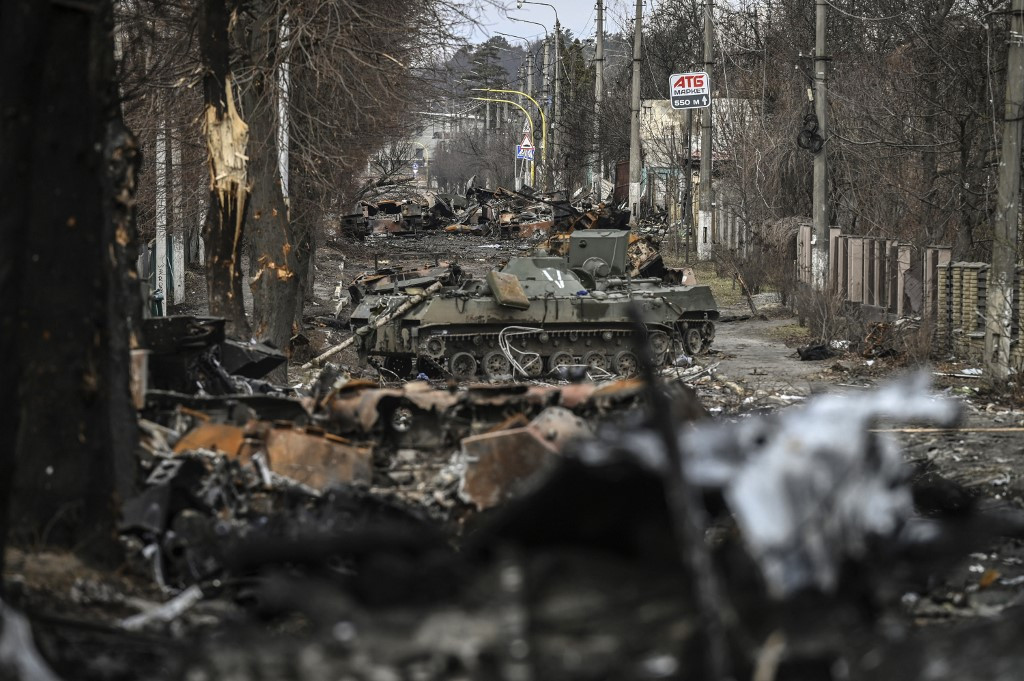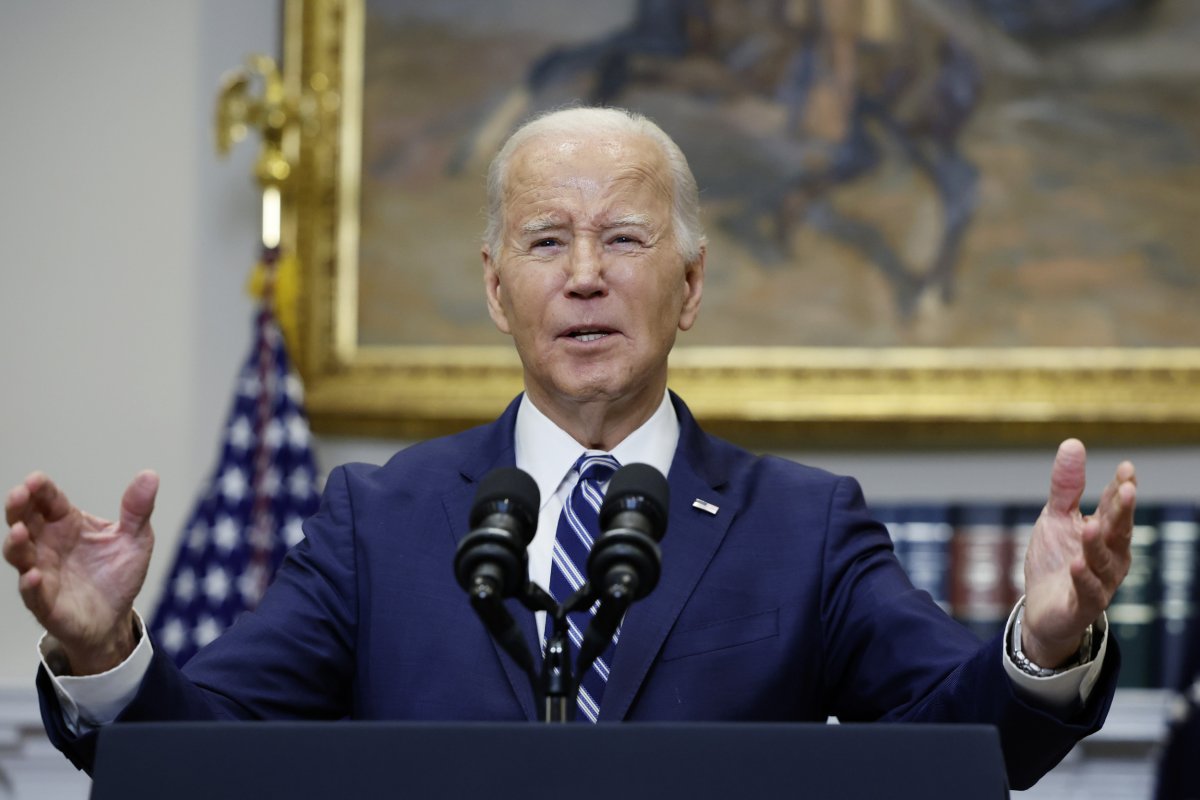Media Investigation Identifies 45,000 Russian Soldiers Killed in Ukraine

It only included the names of soldiers publicly identified in open-source data – mainly obituaries – and warned the real toll may be twice as high.

Media Investigation Identifies 45,000 Russian Soldiers Killed in Ukraine

It only included the names of soldiers publicly identified in open-source data – mainly obituaries – and warned the real toll may be twice as high.

 (@TheArmenianBoy) February 20, 2024…
(@TheArmenianBoy) February 20, 2024…

 (@JamesLLandis) February 20, 2024
(@JamesLLandis) February 20, 2024 US citizen Ksenia Khavana faces 20 years in prison in Russia for trumped up charges of “treason.” Currently in detention in Yekaterinburg. The Los Angeles resident donated $51.80 to Razom for Ukraine, a US charity, on February 24, 2022 – the day Russia invaded Ukraine (again). https://t.co/6paAP4HajU pic.twitter.com/EnxmdbNXPG— Igor Sushko (@igorsushko)…
US citizen Ksenia Khavana faces 20 years in prison in Russia for trumped up charges of “treason.” Currently in detention in Yekaterinburg. The Los Angeles resident donated $51.80 to Razom for Ukraine, a US charity, on February 24, 2022 – the day Russia invaded Ukraine (again). https://t.co/6paAP4HajU pic.twitter.com/EnxmdbNXPG— Igor Sushko (@igorsushko)…
Unlock the Editor’s Digest for free
Roula Khalaf, Editor of the FT, selects her favourite stories in this weekly newsletter.
Russia’s secret services are aggressively pursuing regime change and destabilisation across Europe, Africa and the Middle East, according to a report from a western think-tank.
As part of a revamp sparked by Russia’s invasion of Ukraine, its GRU military intelligence unit is seeking to rebuild its European network of illegal and semi-illegal agents, using tactics recognisable to any reader of cold war spy novels.
These efforts are bolstered by more overt GRU initiatives in Africa, which have taken over special operations formerly carried out by the mercenary Wagner Group led by Yevgeny Prigozhin, who died in a plane crash last year. In the Middle East, meanwhile, an anti-western public relations drive is being led by Ramzan Kadyrov, a loyalist warlord from the Muslim-majority Chechen region.
The aim is to destabilise governments hostile to Moscow and disrupt western support for Ukraine. The methods used — a combination of disinformation, elite capture and violence — are drawn from the Soviet espionage playbook, according to the report published on Tuesday by the Royal United Services Institute think-tank in London.
Moscow was endeavouring to “expand its influence, evade containment, destabilise and disrupt its adversaries, and is making progress”, warned the 38-page report, which draws on internal Russian documents, interviews and other sensitive material.
“In Vladimir Putin’s Russia, special operations are no longer driven by Communist ideology, but they still use the same tools and methods,” said one of the report’s authors, Oleksandr V Danylyuk. “And if the answer is always an ice pick, then every problem also starts to look like Leon Trotsky’s head too,” he added, referring to the Russian revolutionary’s 1940 assassination in Mexico on Stalin’s orders.
Ukraine said on Tuesday that Maksim Kuzminov, a Russian helicopter pilot who defected to Ukraine in 2023, was found dead in Spain last week, his body riddled with bullets. Spain’s interior ministry and police have declined to confirm or deny that the body is Kuzminov’s, saying a judicial investigation into the case, including biometric tests, is ongoing.
Also on Tuesday, Estonia said it had successfully halted a hybrid operation by Russia’s security services on its territory. The Nato member’s security services said the operation involved attacking cars belonging to the interior minister and a journalist in order to sow fear, public broadcaster ERR reported.
Russia’s espionage reforms follow a series of failed putsches led by its intelligence operatives in Ukraine before the outbreak of war two years ago, as well as in Montenegro and Moldova.
As part of the revamp, the RUSI report said a new GRU unit had been created, known as the Service for Special Activities, which now contains the infamous Unit 29155 tasked with foreign assassinations. The UK said GRU agents were responsible for the attempted murder of double agent Sergei Skripal in England in 2018.
Active measures such as violent provocations require authorisation by a committee of the Kremlin’s national security council, led by hardline secretary Nikolai Patrushev. Meanwhile, a new Committees of Special Influence assesses the effectiveness of espionage operations, the report said. Sergei Kiriyenko, a former presidential deputy chief of staff, leads the group.
“The Kremlin realised that it had been getting lots of dud intelligence, especially as agents were being rewarded on the basis of the quantity of information they provided, not its effectiveness,” said co-author Jack Watling. “Now Russian agents are sometimes reporting why targets are not being hit. There is no longer the same inflation of intelligence,” he added.
European espionage networks, weakened by the expulsion of hundreds of alleged spies since the invasion of Ukraine, are being rebuilt with new operatives rather than former special forces soldiers. Often they are supported locally by new recruits drawn from organised crime, the Russian diaspora and foreign students who have lived in Russia. The Balkans was a special area of focus, the report said.
There is also an emphasis on financially self-sustaining operations, often done by agents using seed money from property sales to fund legitimate local businesses.
As well as rebuilding networks in Europe, the report pointed to Russia’s continued focus on Africa, where Moscow seeks to supplant relationships with western countries and seize critical resources.
It has brought Wagner’s operations under the defence ministry’s control and repackaged them into a new offer for prospective allies known internally as “the Regime Survival Package”.
Recommended
This provides local elites with military aid, propaganda expertise and, crucially, economic and political support in the event of UN or western sanctions. In return, mineral and energy concessions — as in Mali, where a mining code reform will allow foreign concessions to be reallocated to Russian companies — finance Moscow’s operations.
“The result is that Russian security partners initially gain a sovereign capability . . . [but] also become dependent,” the report said, adding that this creates “an extremely unequal relationship, in which Moscow extracts much more than it offers”. Targeted countries include Burkina Faso, Niger and Sudan.
A third strand of the Russian efforts to undermine western support is via diplomatic outreach to Muslim communities. Led by Kadyrov, the goal is to build a broad network of influence among Muslim populations in Europe and the Middle East and subvert western interests.
The report cited the troll factories that have amplified Kadyrov’s anti-Israeli comments on social networks since Hamas’s October 7 attack, and Putin’s appointment in July 2023 of Kadyrov’s adviser Turko Daudov as a permanent representative to the Organisation of Islamic Cooperation.
Russia’s special services are actively seeking “to expand their capacity in several areas that pose strategic threats to Nato members”, the report concluded, warning that these “crude” efforts are “steadily becoming more coherent under the close attention of Russia’s presidential administration”.
A number of Republican and MAGA figures have reacted angrily after The Houston Chronicle, one of the biggest newspapers in Texas, endorsed President Joe Biden.
The Houston Chronicle‘s editorial board said they would be backing Biden in the Democratic primary and for re-election so he can “make life better” for the American people as well as prevent the “chaos, corruption and danger to the nation” that would accompany his presumed 2024 Republican challenger Donald Trump returning to the White House.
The Houston Chronicle‘s praise for Biden will be a boost for the Democrat as he seeks re-election in November. It remains to be seen how much of a difference the endorsement will make, seeing as Texas has not voted for a Democratic presidential candidate for nearly 50 years, with Trump beating Biden in 2020 by six points in the red state.
In their editorial, the paper’s board admit that Biden “has his shortcomings,” but what his administration has achieved during his time in office is a “potent reminder to his fellow Democrats, to independents and to those Republicans who have somehow resisted Trump’s cultish appeal that the nation has a viable alternative.”

President Joe Biden delivers remarks on the reported death of Alexei Navalny from the Roosevelt Room of the White House on February 16, 2024 in Washington, D.C. The Houston Chronicle, one of the largest newspapers…
President Joe Biden delivers remarks on the reported death of Alexei Navalny from the Roosevelt Room of the White House on February 16, 2024 in Washington, D.C. The Houston Chronicle, one of the largest newspapers in Texas, has endorsed Biden for re-election. Anna Moneymaker
The editorial notes how the U.S. economy is now “healthier” than any other advanced nation having recovered from the pandemic, unemployment is approaching a 50-year low and that inflation is falling.
The board cites other achievements from Biden’s presidency, such as seeking a “modest effort” to address gun safety, introducing a price cap on insulin, leading an allied response to Russian President Vladimir Putin‘s “brutish” invasion of Ukraine as well as seeking a “path to peace and stability in the post-October 7 conflagration involving Gaza, Iran and Israel and the desperate Palestinian people.”
“We are well aware that the Biden administration has not been successful on every front,” the board wrote.
“The calamitous withdrawal from Afghanistan was the most obvious failure. The administration’s inability to quell chaos at the border is another, although blame primarily belongs to caviling and cynical MAGA Republicans in the House.
“In servility to Trump, they torpedoed a bipartisan border-security plan painstakingly crafted in the Senate. Biden can’t solve the crisis by executive order; he needs Congress to act.”
In response, a number of Trump supporters lashed out at the paper for their endorsement of Biden on social media.
Steve Guest, a former spokesperson for Texas Senator Ted Cruz, posted on X, formerly Twitter: “Untethered from reality. REMINDER: the economy is a mess, our country is being invaded and the border is wide open, and the world is on fire from the Middle East to a ground war in Europe due to Joe Biden’s policies.”
Talk show host Joe Pagliarulo wrote: “O M G—I just LOVE this parody account for the Houston Chronicle. Kudos!!”
Comedian and political commentator Tim Young posted: “Fill the Houston Chronicle office with illegal immigrants. They endorse it, they can house it.”
Robert Bowlin, who frequently supports Trump on social media, added: “So, do you just not care about the fact that he can barely speak and he appears to be on the verge of tears in every press hearing?”
The Houston Chronicle board did note the concerns about the age and cognitive ability of Biden, who will be 82 by the start of his potential second term in office, and said that he may not be the “energetic, garrulous, occasionally even eloquent” public speaker of previous years.
However, the board suggested the president has “forgotten more than his presumed Republican rival will ever know. That’s not saying much, and at the same time, it says it all.”
Trump’s office has been contacted for comment via email.
Newsweek is committed to challenging conventional wisdom and finding connections in the search for common ground.
Newsweek is committed to challenging conventional wisdom and finding connections in the search for common ground.